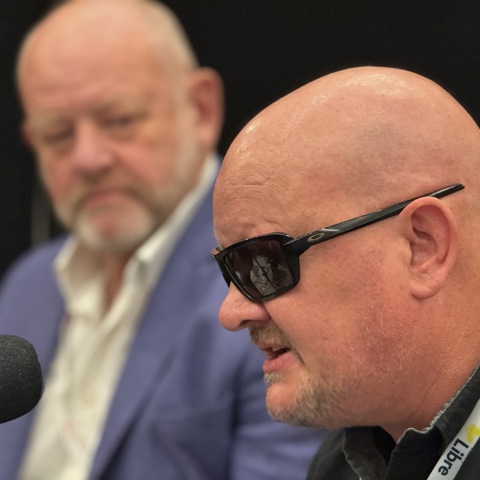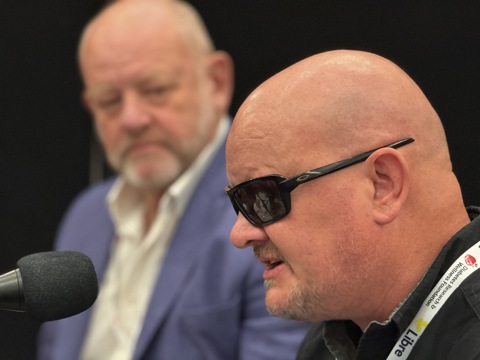
DRWF Events: Supporting people living with diabetes-related eye complications
Following the recent United Through Diabetes educational event we are sharing a series of interviews from the day with leading healthcare professionals and people working in diabetes.
We hope everyone who attended the recent United Through Diabetes event had a great day with us and went home with the tools, knowledge, practical skills, and confidence to enhance your diabetes self-management and overall health and wellbeing.
The event Digital Hub provides an opportunity to recap on content from the day, plus access even more content to help you manage your diabetes – for both attendees and those who were not able to attend but would like to find out more.

DRWF interviews from United Through Diabetes: Talking about eye health and diabetes with a group of experts working to support people living with diabetes-related eye complications.
Colin Daniels, Working Age and Young People Service Manager, The Macular Society
“The Macular Society supports everybody with any type of macular disease, including diabetic macular oedema. We are predominantly a support organisation, but we also fund research. This year we funded around £3 million worth of new research into macular disease. It is equally as important to keep people up to date with information about all different types of macular disease and offer peer support.
“People with diabetes can have macular oedema or diabetic macular oedema, which can creep up on them quite quickly and can be very scary. We offer lots of good quality information around how to manage the condition – not just the physical side of it, but the but the emotional side as well. We have a counselling service that people can utilise on the website, or through the helpline. Alongside that, we have a massive network of peer support groups.”
Richard Kirk, Chief Executive, PolyPhotonix
“We have developed a deceptively simple treatment for diabetic retinopathy - the Noctura 400 Sleep Mask. It takes the form of a mask that you wear at night.
“It works on the principle that when we go to sleep at night the different photoreceptors act and behave in different ways – and we dark adapt, we have done this through evolution. It is only really in the last 100 years we have had electric lights and we have not needed to dark adapt.
“When we dark adapt counterintuitively, the oxygen demand in the retina increases dramatically. So even though you are asleep, your retina is going hyperactive, and it's asking for more and more oxygen. When it does that, we get neovascularisation, or new vessel growth in the retina. This is the problem.
“Everybody dark adapts, but if you have diabetic neovascularisation, new vessels in the retina are compromised and weak. That is one of the causes of diabetic retinopathy. We start to get bleeds and cysts in the retina. This leads to thickening in the retina and oedema develops.
“We worked out that if we could suppress dark adaptation in the retina using light, then we could in effect tell the brain, you are not asleep. That was the hypothesis. We spent the last 10 years researching it.
“The mask is worn at night and how it works is very simple. It suppresses dark adaptation. By doing that, in layman's terms, we are taking the stress out of the retina and in all our clinical trials 96% of patients in the trial saw clinical improvements.”
Christy Moore, Deputy Programme Manager, Arden Herefordshire and Worcestershire diabetic eye screening programme
“Diabetic eye screening is offered every year to two years, depending on the patient results. When people are newly diagnosed, their GP will refer to us, and we will invite them in.
“We look out for any damage to the back of the eye called diabetic retinopathy or maculopathy. If we see it, we can refer them to where they need to go, or we can keep an eye on them a little bit closer, in what we call a digital surveillance pathway.
“We have got a new patient portal where patients can now scan a QR code or go on a link. They can schedule their appointments rearrange, and they can access the results, download them on there and see their images online on our new patient portal. And that's accessible via their NHS login. We are trying to be more environmentally friendly and cut down on our postage and paper usage.
“There is something called seven-field photography which is going to roll out towards the end of this year. That is where we can see all the seven quadrants of the eye and we can then keep more patients in our programme reducing the amount that are being referred to the eye hospital.
“Once we have got the photography, these will be graded. We will refer that onto the eye hospital.”
Bhavini Makwana, Eyecare Liaison Officer at Solihull Hospital also working for the Royal National Institute of Blind People (RNIB)
“At the Royal National Institute of Blind People we offer a range of services and products to patients diagnosed with eye conditions or living with vision impairment.
“The support available ranges from sight loss advice service, from general eye condition information to information about diabetic retinopathy. We have a dedicated eye health team and other services like technology support team, peer support counselling and benefits advice team. There are also activities in local communities, where patients can reach out to their community connect who can advise them about the local service so that they are preventing any isolations, and any kind of information they are seeking, that can help them retain their independence.
“My role is an Eye Care Liaison Officer. Each hospital or your local sight loss charity may have their own eye care liaison officers. Our roles are non-medical, but we are there to provide any kind of information and support to patients. Under that area, the catchment area falls under the hospital relating to their vision.
“We are trying to build a pathway at the moment where patients are picked up from the start of their eye care journey, so that they can be supported through from the beginning of when they're diagnosed and referred to more services for however long they need. Because everyone is different and not everyone's condition is the same, but experiences can be the same.”
Thank you for listening to this Living With Diabetes special podcast report from United Through Diabetes 2024, presented by Claire Levy and brought to you by DRWF.
Visit the DRWF United Through Diabetes Digital Hub for more information and resources from the day
Listen to our interviews with key speakers and sponsors on our audio interview page
For news on all upcoming DRWF events please visit the event page
Read the DRWF diabetes information leaflet Eye health and diabetes
I would like to make a regular donation of
I would like to make a single donation of
There are lots of ways to raise money to support
people living with all forms of diabetes.
Bake, Swim, Cycle, Fly ... Do It For DRWF!
Fundraise with us
Recent News


